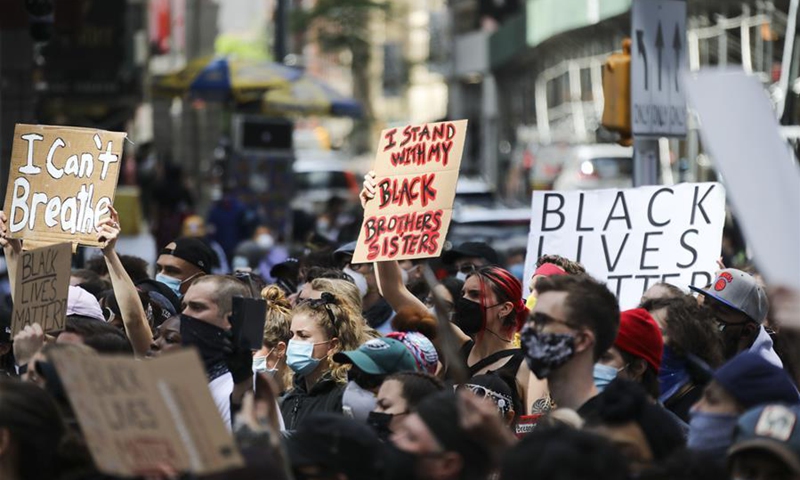US human right defects a systematic problem rooted in the US society: observers
By GT staff reporter Source: Globaltimes.cn Published: 2020/7/8 4:18:09

People protest over the death of George Floyd in New York, the United States, June 1, 2020. Photo: Xinhua
Two Chinese professors delivered speeches on a virtual forum themed "Racism and social discrimination in the US" on Tuesday, sharing their opinions on human rights along with four foreign experts.
The sideline event was held at the 44th United Nations Human Rights Council based on the tragic events that unfolded on May 25, 2020 in Minneapolis, resulting in the death of George Floyd and worldwide protests.
The experts said that the national protest is against systemic racism and state sponsored racial violence that gives police impunity. Discriminatory, denigrating, tortuous and racist treatment are rooted in American culture.
Zhou Li, Head of Scientific Research Dept. Southwest University of Political Science and Law, told the Global Times on Tuesday that the meeting shows international society's concern for human rights issues.
Statistics and case studies have been used to show discrimination and inequality are rooted in the US. "We are so calm [because what we see] seems to have become commonplace," said Zhou.
American attorney and Gideon Award recipient, Mark Burton, said it is a shame the US twice withdrew from the UN's Human Rights Council. Zhou said that as an American, Burton wants to solve the problem under the framework of the UN with moral responsibility.
According to Zhou, the institutional and psychosocial structure of the US is heavily influenced by white supremacy, which has led African-Americans to suffer from discrimination and exclusion for a long time.
Zhou warned that problems in the US may not just be domestic. "The US implanted its economy and values onto the world. If there are any defects of the justification and legitimacy rooted in the inherent institutional design and key values imposed by the US, there might be some impacts on the world."
Zhang Wanhong, the executive director of Wuhan University Institute for HR Studies, shared his opinion of the racist discrimination that Asian-Americans have encountered in the US from the perspectives of history, law and reality.
Zhang said that since labor arrived in the US in the mid-19th century, Asian-Americans have faced enormous inequalities and barriers in education, the workplace, and the right to vote. Since the COVID-19 outbreak, US President Donald Trump gave the coronavirus, technically called COVID-19, names: the "China virus" and Kung Flu. Anti-Asian American harassment has also been further stoked by Trump's repeatedly using these terms.
According to Zhang, racism and xenophobia in the US during the pandemic prevention and control process will have multiple negative consequences including undermining solidarity in global cooperation against the pandemic, deterioration of the lives and livelihoods of some ethnic groups and further strengthen the existence of racism and xenophobia. Therefore, he called for a collaboration between the Asian Americans and African-Americans.
On June 17, the Human Rights Council held an urgent debate on current racially inspired human rights violations, systemic racism, police brutality and violence against peaceful protests and adopted the resolution A/HRC/43/1 subsequently.
Many observers believe it is necessary to highlight actions to end racism, racial discrimination, hate speeches and other related forms of intolerance.
Alfred de Zayas, professor from Geneva School of Diplomacy and former independent expert of the UN, said that there is a fascination for killing in the US society, which we could see in countless television programmes and video games.
"Too many Americans have guns," said Zayas, noting cases where white Americans shot un-armed African-Americans when they felt "threatened."
Zayas believes that Trump's call for "law and order" is not a sustainable solution. "Trump wants the problem to go away, without recognizing the necessity to addressing the root causes, among them are social injustice, income inequality, lack of proper education, training, and employment possibilities."
"A much greater effort must be invested in providing education for peace, education for empathy, and education for solidarity," he said.
Posted in: AMERICAS